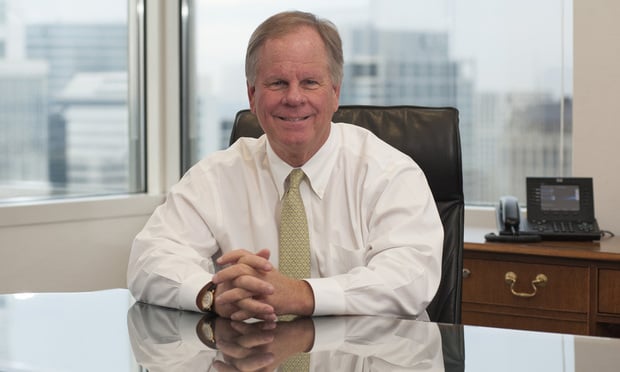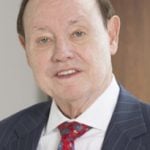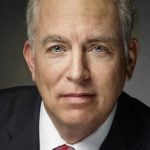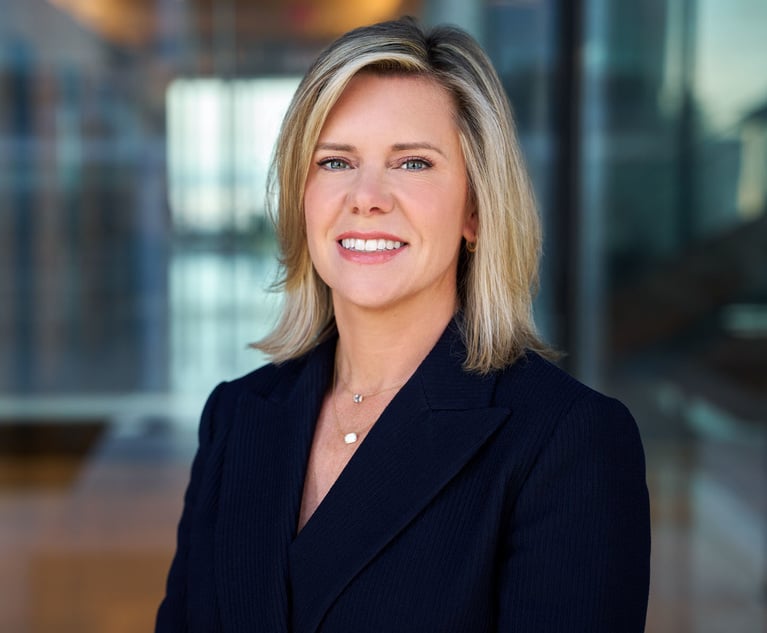Winston & Strawn's Expansion Drive Pushes the Firm Toward a Record Year
Chairman Tom Fitzgerald's personal touch to lateral recruiting has facilitated major moves—and a big hike in revenue this year.
November 29, 2017 at 12:32 PM
18 minute read
 Tom Fitzgerald, chairman, Winston & Strawn
Tom Fitzgerald, chairman, Winston & Strawn
In the post-financial crisis legal market, law firms are not supposed to have years like the one Winston & Strawn is finishing up.
According to ALM Intelligence, the 900-plus lawyer firm added more lateral partners this year through September—68—than any Am Law 100 firm other than DLA Piper, which brought on the same number despite being nearly four times the size of Winston. Winston's leadership expects revenue in 2017 to approach $1 billion; which would be a nearly 20 percent jump from the year prior. Only one firm in last year's Am Law 100, Baker Botts, posted a revenue increase that large without a merger.
“It will be the best year the firm has ever had,” says the firm's longtime chairman, Tom Fitzgerald.
One key reason for Winston & Strawn's success this year is the relentless recruiting effort Fitzgerald turned in. Chicago-based Fitzgerald has had a whirlwind year, flying across the globe to personally recruit virtually all the large groups of partners that Winston & Strawn has pulled from firms that included Parke and McDermott Will & Emery, among others.
Fitzgerald is poised to continue his recruiting thanks to another key to Winston & Strawn's financial success this year: The settlement of a large case the firm handled on a partial contingency since 2012. In June, Winston & Strawn's client Beef Products Inc. reached a confidential settlement with the Walt Disney Corp. to resolve defamation claims the South Dakota company brought following 2011 reports by Disney-owned ABC News that called the company's product “pink slime.”
The size of the settlement is confidential. But Disney reported in August that it paid $177 million more than its insurance coverage to settle the case. Beef Products' damages claim was $1.9 billion, which could have been tripled to $5.7 billion under a South Dakota defamation law. In a somewhat rare move, Winston & Strawn's 27-member executive committee voted to retain some of the firm's fee to put toward future investments in lateral recruiting.
If Fitzgerald's pockets weren't flush enough from that settlement, the firm in April will also start receiving the first capital payments from nonequity partners as a result of a vote this year to eliminate its income partner tier. Those capital payments will come in over a three-year period and are part of Fitzgerald's goal to create a “fortress-like balance sheet” that will buffer the firm against increased legal market volatility.
“He's turned himself into a huge competitor of mine with the money that he got from the pink slime case,” one recruiter says of Fitzgerald. “He's calling people directly.”
Behind Winston's transformative year is a story about a chairman who is equal parts recruiter and CEO—a numbers-driven tax lawyer who was also blessed with “the gift of gab” as one new partner puts it. But it is also a story about how the erosion of the billable hour is changing the relationship between law firms and financial risk, and what firms can do to harness that change in their favor.
The Plan
The lobby in the conference floor of Winston & Strawn's Chicago headquarters is a long, cavernous space with just a few chairs, plush carpet and a wood paneled ceiling. If you look out the window towards Lake Michigan, Chicago's modern skyline will remind you it's not 1990. Fitzgerald bounds through this lobby to greet me in a conference room, and after 30 minutes of relaxed get-to-know-you talk, Fitzgerald launches into a detailed from memory story of Winston & Strawn's year. In his telling, the story dates back to a post-recession understanding by firm leadership that the firm needed to bring in more revenue.
To accomplish that, Winston & Strawn adopted two broad objectives: The Chicago-based firm would have to expand geographically, and it needed to be more selective about the people and practices it invested in.
 Dan Webb, co-chairman, Winston & Strawn
Dan Webb, co-chairman, Winston & StrawnWinston & Strawn has a reputation as a strong trial firm with deep ties to Chicago. The firm's former chairman was the longtime Illinois Gov. James Thompson. Winston & Strawn's current co-chairman, Dan Webb, led the firm's 2006 mostly pro bono defense of another former Illinois governor, George Ryan, who was convicted on public corruption charges. Webb's career-long exploits, beginning as the U.S. attorney for Chicago who helped sleuth out corruption in the judicial system in an operation known as Operation Greylord, have gone a long way to cementing Winston & Strawn's chops as a trial firm.
Moving beyond Chicago and into other practices was a path already traveled by traditional Windy City firms whose growth had eclipsed Winston & Strawn. Kirkland & Ellis, another Chicago firm with a fearsome reputation in litigation, had long been in more cities than Winston & Strawn, following private equity clients around the world and developing a pre-eminent corporate practice under chairman Jeffrey Hammes. Sidley Austin had expanded to China in 1996 and by 2006 was bringing in more than twice the revenue of Winston & Strawn, according to The American Lawyer.
Winston & Strawn set its sights on expanding its corporate presence in New York in particular, Fitzgerald says. In 2009, the firm brought on nine Nixon Peabody private equity lawyers including Dominick DeChiara, who is now chair of the firm's corporate department. When Michael Elkin, Winston & Strawn's vice chairman, took over the New York office about eight years ago, the outpost had about 80 lawyers. It's now at about 250, he says.
Winston & Strawn's strategy has shown some results, with the firm growing revenue by 35 percent and increasing its office count from eight to 18 since 2006. Still, Winston & Strawn's head count had stayed virtually flat even as the firm expanded into Hong Kong in 2008; Beijing and Shanghai the following year; Houston in 2011; Silicon Valley in 2013; and Dubai in 2015.
Even so, the gap that opened up between Winston & Strawn and its once-local competitors hasn't gone away. Kirkland's revenue grew 132 percent from 2006 to 2016. Sidley's went up 55 percent. Winston's rose 35 percent. Winston's profits per equity partner, up 52 percent, also failed to keep pace with those larger firms, as Kirkland's PPP soared 81 percent and Sidley's rose 63 percent.
Fitzgerald and the firm's leadership undertook a strategic planning process about a year ago. It created a steering committee; interviewed practice group leaders and others across the firm; held town halls to discuss goals more broadly; and the executive committee ultimately adopted the plan. One broad conclusion was the firm was performing well on the score of efficiency, productivity and profitability. But it still needed to scale up.
“We did not have the revenue size to take that to the next level,” Fitzgerald says. “And therefore we concluded we had to make some additional investments to generate the revenue opportunities to be more efficient and better leverage our platform.”
The plan was to again grow into a new region, and the firm picked its first target: Dallas.
Next stop: Dallas
 Tom Melsheimer, Dallas managing partner, Winston & Strawn
Tom Melsheimer, Dallas managing partner, Winston & Strawn“There's only a 20 percent chance that I'd ever think about doing something like this,” Tom Melsheimer, then the managing partner of Fish & Richardson's Dallas office, recalls telling Fitzgerald at the pair's first meeting to discuss the possibility of Melsheimer's joining Winston & Strawn. It was around Labor Day 2016.
“That's fine, I'll take it,” Fitzgerald responded.
Fitzgerald kept the ball rolling by setting up an October dinner in a private room at Dallas' Crescent Club. Melsheimer, a trial lawyer, met with Fitzgerald and two of Winston's top courtroom advocates: Webb and co-chairman Jeffrey Kessler, the New York-based lawyer known for his high-stakes antitrust and sports litigation, including representing Tom Brady in the “Deflategate” scandal. That meeting wasn't enough to sway Melsheimer, who told the group he wasn't going to make a decision before the end of 2016.
But Melsheimer wasn't the only high-powered Dallas partner Fitzgerald was working to move. Fitzgerald had an ambitious plan to open a full-service Dallas office with groups of elite partners from a number of firms. He viewed the city as a natural next step for Winston & Strawn for a few reasons. The firm already had about 10 important clients that either were headquartered or had a large corporate presence there. He didn't think the city was as saturated with top Big Law brands as some others. And Fitzgerald was convinced there was top talent to be had in private equity and finance, real estate, litigation and white-collar investigations.
Bryan Goolsby, the former chairman of Locke Lord, was the first person Fitzgerald had reached out to. The two spoke in late May 2016, Goolsby says. Goolsby was intrigued by Fitzgerald's idea to open an office from scratch with top-tier lawyers in a broad range of practices from litigation to transactions. A tax lawyer like Fitzgerald, Goolsby also shared the Winston & Strawn chairman's numbers-driven approach to managing a law firm. Goolsby was an early commit to joining Winston & Strawn, he says, provided the firm could pull together the talent that Fitzgerald was recruiting.
For Melsheimer, Winston & Strawn was a firm that would provide more support for his broader commercial litigation practice than IP-focused Fish & Richardson. Melsheimer says he and a group of younger partners “were swimming upstream” doing commercial litigation under Fish's IP-focused brand. In December, Melsheimer sent a group of younger partners to Winston & Strawn's Chicago office to vet the firm. The response, Melsheimer says, is that the firm's trial skills would help them get cases beyond intellectual property matters.
Fitzgerald's personal touch also helped close the deal, Melsheimer and Goolsby say. Melsheimer says that Fitzgerald stressed their connection as Notre Dame alumni. Goolsby says that he and Fitzgerald mostly talked numbers. Fitzgerald “is a very quick study on what motivates the people he's talking to,” Goolsby says.
“Tom is just a guy that never met a stranger,” Melsheimer says. “He enjoys meeting people and he's got a real conviction of selling the firm. He's strangely egoless for a head of a major firm. He doesn't come across talking too much about himself. He talks about the firm.”
Fitzgerald, who joined Winston & Strawn 38 years ago out of law school, is the son of a furniture store owner from Joliet, Illinois, a rough-and-tumble town on the outskirts of Chicago. “I feel like the firm has given me every opportunity of my life,” Fitzgerald says. “I owe the firm a lot. I really do.”
All told, Fitzgerald spent 43 nights in Dallas this year recruiting. None were as important as Dec. 17, the night he arranged a dinner he likened to a “blind date.” At a private room again at the Crescent Club, one after another, 23 partners from eight different firms walked in—the first meeting of the entire group Fitzgerald had assembled to launch the Dallas office. It opened in February. By late October, its head count had reached 51 lawyers.
Ever-focused on numbers, Fitzgerald says the Dallas office is already the firm's second-most productive from an hours-per-lawyer standpoint. “It's a very engaged, productive office and it will be a major revenue component of the firm this year from a standing start, from nothing,” Fitzgerald says.
Cross-Country Momentum
The Dallas opening turned heads in the legal market, and led last spring to an opportunity for Fitzgerald to meet with Kathi Vidal, a leading partner at Fish & Richardson.
A well-known Silicon Valley IP litigator who once led the litigation department at Fish, Vidal was exploring a move from her longtime firm. Piqued by Winston & Strawn's ability to bring in the type of talent that started the Dallas office, she ended up speaking with Winston & Strawn and two other firms she declined to name.
Vidal had long practiced at Fish with Melsheimer. When Melsheimer heard his former partner would be meeting with Fitzgerald, Melsheimer suggested Fitzgerald wear something other than his patented navy blue suit—maybe a golf shirt—for his meeting with Vidal at the Four Seasons in Palo Alto.
“I'm sorry for not wearing a suit,” Fitzgerald said to greet Vidal.
“You've got a jacket that matches your pants. I'm really not sure what part of this is not a suit,” Vidal responded. Fitzgerald hadn't taken Melsheimer's advice, but the joke went over well.
Vidal says a few things stood out to put Winston & Strawn on the top of her list. Fitzgerald told her in their initial meeting he wanted her to be the person to grow the firm's Silicon Valley office. She says he told her the firm had opened the Silicon Valley office about seven years earlier but was waiting to grow the office until it found the right lawyer to lead it.
His talk also had an “empowering” message, Vidal says. He wanted her to be the architect of how the Silicon Valley office would grow.
“They find the right leaders, they put them in place and they empower them,” Vidal says. “The idea that you would pick leaders and turn leadership over to them is not the way lawyers typically work.”
Vidal signed on in April to lead the Silicon Valley office, which Winston & Strawn had opened in 2013. She has expanded the office with the addition of five lateral partners as well as two partners relocating from the firm's Chicago office.
One lure Fitzgerald hasn't been shy about using is offering high-profile laterals a spot on Winston & Strawn's now-27-member executive committee. Melsheimer and Vidal are both members. Fitzgerald credits the partnership for being “accepting” of outsiders in leadership positions.
Winston & Strawn made two other large group hires this year. The first came after a friend told Fitzgerald that McDermott Will & Emery's top-ranked executive compensation and benefits team was looking for a new home. The leader of that group, David Rogers, had run unsuccessfully for the chairman role at McDermott last year and had been in conversations with a number of firms by the time Fitzgerald heard there was a chance to make a deal.
Fitzgerald says he flew to meet Rogers in Washington, D.C., and within a couple days of analysis told the McDermott partner that Winston & Strawn would hire the entire team.
“He was a little surprised at that,” says Fitzgerald. “We went to our executive committee in 20 days to get it approved and move on it. So, we can move very quickly.”
Fitzgerald says that the firm was already looking to bolster its executive compensation capabilities and he saw no better way to do that than to bring on an intact group with the broad capabilities of McDermott's team.
Fitzgerald says the former McDermott group was attracted to Winston & Strawn in part because of its commitment to bring them in as a group, and because it saw Winston's labor and employment practice, often a feeder for executive compensation work, as big enough to bring in new work for the team.
In July, nine partners and one counsel made the move. The group included Nancy Gerrie, a former managing partner of McDermott's Chicago office. She is now co-chair of Winston's employee benefits and executive compensation practice.
The last major hire of the year came in August, when a group of 10 former Chadbourne & Parke finance partners joined shortly after Norton Rose Fulbright cemented its merger with that firm. The New York-based lateral group handles capital markets work for Latin American clients in conjunction with local firms.
Fitzgerald says that Norton Rose's offices throughout Latin America would have represented a conflict for the group. The deal was completed within a week, he says.
The Settlement
Winston & Strawn's decision to take BPI's “pink slime” defamation case against ABC News owner Walt Disney Corp. on a partial contingency fee was a gamble. The firm did not expect its investment would grow to the size it did, and by all accounts it didn't anticipate the reward it received when BPI agreed to a settlement in June.
The case dates back to a series of news reports ABC ran between 2011 and 2012 that called BPI's product “pink slime,” decimating demand for what's known in the industry as “lean, finely textured beef” (LFTB). In the complaint Winston & Strawn filed on BPI's behalf in September, 2012, the company said that LFTB production dropped from 5 million pounds a week to less than 2 million pounds, forcing BPI to close three out of its four plants and lay off more than 700 employees.
Webb says he convinced the firm to take the case on a partial contingency, which was helpful to BPI as its business had taken a big hit from the negative press coverage. Winston & Strawn has traditionally dedicated 1 to 2 percent of its work in progress to contingent fee cases, Fitzgerald says. When Webb came with the BPI case, the firm had no contingent fee cases on its books. Still, Fitzgerald says, it is “unlikely” the firm would have taken the case if not for Webb being the lead lawyer.
“Dan in front of a jury? I'll take that bet,” Fitzgerald says.
The case went on for more than four-and-a-half years with defendant Disney represented by Williams & Connolly chairman Dane Butswinkas and co-chair Kevin Baine. It settled in a South Dakota state court shortly after Webb spent 17 days putting on the plaintiff's side of the case.
Webb, who said the settlement was the largest ever in the United States for a media defamation case, says he also didn't expect the case to cost the firm as much as it did, though the firm declined to detail how much it spent in the case. (Jury verdicts in defamation cases have reached at least $1 billion.)
“We invested more money than I had wanted to,” Webb says. “I didn't want the firm to be that much at risk. But we also ended up with a huge reward by what happened [when the case settled].… Winston gets a very large check. No more waiting. My client gets a large check. It's over.”
Winston & Strawn declined to comment on how much it took home. But, thanks in part to the settlement, Winston's lateral hiring binge isn't likely to end soon. The firm's executive committee in September voted unanimously on how to use the fees. Apart from the usual payouts to the lawyers who handled the case and a distribution to partners, the firm will put a portion toward lateral hiring, though Fitzgerald declined to say how much.
“It's a real testament to Tom's leadership and the forward-looking nature of the firm that we're thinking about it in those terms,” says Linda Coberly, Chicago office leader and executive committee member. “This is a very old firm, particularly in Chicago, and yet I feel like especially in the last few years we've been able to take a turn where we are focusing on our future as much as on our history.”
Fitzgerald's latest term as chairman expires in August. While he will only say “the partners will decide” if he stays on, all indications are he will continue on in the role he took over in 2006. In the meantime, he will continue to sell his belief in the firm to lateral partner candidates.
“I count my blessings and thank people every night because I'm a lucky guy,” Fitzgerald says. “I mean, come on. A kid from Joliet, Illinois.”
This content has been archived. It is available through our partners, LexisNexis® and Bloomberg Law.
To view this content, please continue to their sites.
Not a Lexis Subscriber?
Subscribe Now
Not a Bloomberg Law Subscriber?
Subscribe Now
NOT FOR REPRINT
© 2025 ALM Global, LLC, All Rights Reserved. Request academic re-use from www.copyright.com. All other uses, submit a request to [email protected]. For more information visit Asset & Logo Licensing.
You Might Like
View All
O'Melveny, White & Case, Skadden Beef Up in Texas With Energy, Real Estate Lateral Partner Hires
5 minute read
DLA Piper Hires Former FAA Chief Counsel as Transportation Practice Co-Chair
Trending Stories
- 1Considerations for Establishing or Denying a Texas Partnership to Invest in Real Estate
- 2In-House AI Adoption Stalls Despite Rising Business Pressures
- 3Texas Asks Trump DOJ to Reject Housing Enforcement
- 4Ideas We Should Borrow: A Legislative Wishlist for NJ Trusts and Estates
- 5Canadian Private Equity Firms Are Eyeing Tech Sector
Who Got The Work
J. Brugh Lower of Gibbons has entered an appearance for industrial equipment supplier Devco Corporation in a pending trademark infringement lawsuit. The suit, accusing the defendant of selling knock-off Graco products, was filed Dec. 18 in New Jersey District Court by Rivkin Radler on behalf of Graco Inc. and Graco Minnesota. The case, assigned to U.S. District Judge Zahid N. Quraishi, is 3:24-cv-11294, Graco Inc. et al v. Devco Corporation.
Who Got The Work
Rebecca Maller-Stein and Kent A. Yalowitz of Arnold & Porter Kaye Scholer have entered their appearances for Hanaco Venture Capital and its executives, Lior Prosor and David Frankel, in a pending securities lawsuit. The action, filed on Dec. 24 in New York Southern District Court by Zell, Aron & Co. on behalf of Goldeneye Advisors, accuses the defendants of negligently and fraudulently managing the plaintiff's $1 million investment. The case, assigned to U.S. District Judge Vernon S. Broderick, is 1:24-cv-09918, Goldeneye Advisors, LLC v. Hanaco Venture Capital, Ltd. et al.
Who Got The Work
Attorneys from A&O Shearman has stepped in as defense counsel for Toronto-Dominion Bank and other defendants in a pending securities class action. The suit, filed Dec. 11 in New York Southern District Court by Bleichmar Fonti & Auld, accuses the defendants of concealing the bank's 'pervasive' deficiencies in regards to its compliance with the Bank Secrecy Act and the quality of its anti-money laundering controls. The case, assigned to U.S. District Judge Arun Subramanian, is 1:24-cv-09445, Gonzalez v. The Toronto-Dominion Bank et al.
Who Got The Work
Crown Castle International, a Pennsylvania company providing shared communications infrastructure, has turned to Luke D. Wolf of Gordon Rees Scully Mansukhani to fend off a pending breach-of-contract lawsuit. The court action, filed Nov. 25 in Michigan Eastern District Court by Hooper Hathaway PC on behalf of The Town Residences LLC, accuses Crown Castle of failing to transfer approximately $30,000 in utility payments from T-Mobile in breach of a roof-top lease and assignment agreement. The case, assigned to U.S. District Judge Susan K. Declercq, is 2:24-cv-13131, The Town Residences LLC v. T-Mobile US, Inc. et al.
Who Got The Work
Wilfred P. Coronato and Daniel M. Schwartz of McCarter & English have stepped in as defense counsel to Electrolux Home Products Inc. in a pending product liability lawsuit. The court action, filed Nov. 26 in New York Eastern District Court by Poulos Lopiccolo PC and Nagel Rice LLP on behalf of David Stern, alleges that the defendant's refrigerators’ drawers and shelving repeatedly break and fall apart within months after purchase. The case, assigned to U.S. District Judge Joan M. Azrack, is 2:24-cv-08204, Stern v. Electrolux Home Products, Inc.
Featured Firms
Law Offices of Gary Martin Hays & Associates, P.C.
(470) 294-1674
Law Offices of Mark E. Salomone
(857) 444-6468
Smith & Hassler
(713) 739-1250












